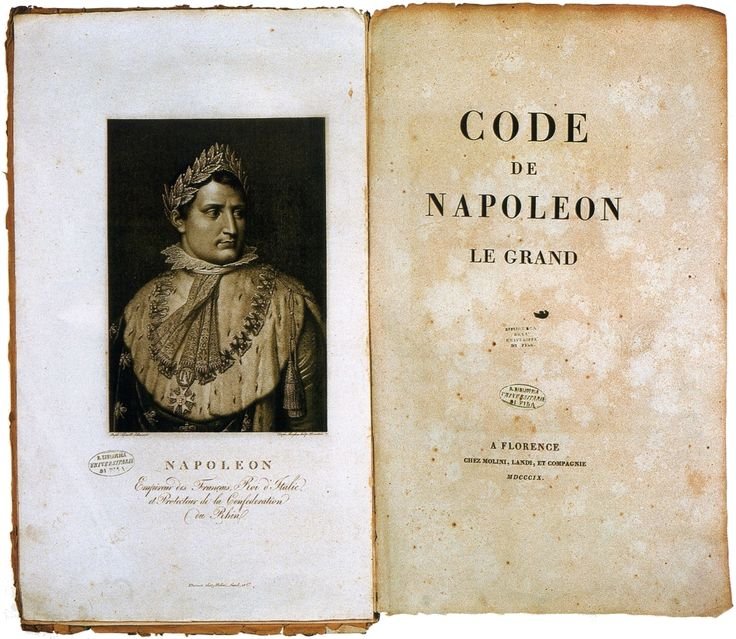Napoleonic Code: Why Was One Of The Most Influential Civil Codes Flawed?
A. Sutherland - AncientPages.com - Napoleonic Code was the French Civil Code introduced under Napoleon I on 21 March 1804.
It was the first consistent set of laws concerning criminal and commercial law, property, the family, colonial affairs, and individual rights, given by Napoleon to his people living in post-revolutionary France. The Code eliminated feudalism, supported religious tolerance, and introduced other liberal European reforms.
It is a set of organized laws, considered one of Napoleon's most essential and lasting legacies. The French military commander and political leader Napoleon Bonaparte (1769–1821) was inspired by Roman law and principles of the French Revolution to create this progressive legal system,
It has been generally considered a progressive legal system reflecting broad-minded values. The Code required that for laws to be applied appropriately, secret laws were ended. Ex post facto laws were invalidated, and procedures were needed to make the application of the rules fair.
Unfortunately, colonial slavery was reintroduced. The Code was modified and widely adopted outside France in Europe and the Western Hemisphere.
However, the Napoleonic Code made the authority of men over their families stronger, deprived women of any individual rights, and reduced the rights of illegitimate children.
The Code may not have been favorable for women, historians say.
Napoleonic Code And Women
The Code made women legally and economically dependent on men. Women acquired their husbands' nationality upon marriage and had to reside where their husbands desired. The Code guaranteed the supremacy of the man over his wife and children; the husband was the ruler of the household.

Code de Napoleon Le Grand/ The Napoleonic Code. Source
In "Changing Lives: Women in European History Since 1700", Bonnie G. Smith writes:
"Women could not participate in lawsuits or serve as witnesses in court or as witnesses to civil acts such as births, deaths, and marriages. Such a reduction in a woman's civil status enhanced that of the individual male.
Moreover, the Code reduced, if not eliminated, male accountability for sexual acts and thrust it squarely on women. For example, men were no longer susceptible to paternity suits or legally responsible for the support of illegitimate children.
Economically, women were weakened if they bore illegitimate children. Men, on the other hand, were not so affected if they fathered them. Finally, female adultery was punished by imprisonment and fines unless the husband relented and took his wife back.
Men, however, suffered no such sanctions unless they brought their sexual partners into the home. The sexual behavior of women was open to scrutiny and prescribed by law, whereas that of men, almost without exception, had no criminal aspect attached to it.
Thus, "male sexuality was accepted with few limitations, but women's was only acceptable if it remained within strict domestic boundaries." (Bonnie G. Smith, Changing Lives: Women in European History Since 1700)
The abolition of divorce by mutual consent amounted to a significant regression for French women.
- A woman cannot contract a new marriage until ten months have elapsed from the dissolution of the preceding marriage.
- The wife may demand a divorce on the ground of adultery in her husband when he shall have brought his concubine into their shared residence.
- The married parties may reciprocally demand divorce for outrageous conduct, ill-usage, or grievous injuries, exercised by one of them towards the other. 1
As the Napoleonic Code strongly influenced many legal systems in Europe and the New World, it also set the terms for treating women widely. Napoleon was pleased that his new laws had been spread throughout the empire, and said late in his life:
'Waterloo will wipe out the memory of my forty victories, but that which nothing can wipe out is my Civil Code. That will live forever.'
An original copy of the Napoleonic Code is stored in the Historisches Museum der Pfalz in Speyer, Germany.
Written by – A. Sutherland - AncientPages.com Senior Staff Writer
Updated on January 1, 2024
Copyright © AncientPages.com All rights reserved. This material may not be published, broadcast, rewritten or redistributed in whole or part without the express written permission of AncientPages.com
Expand for referencesReferences:
Smith B. G. The Oxford Encyclopedia of Women in World History
- Philip G. Dwyer, Napoleon and Europe
More From Ancient Pages
-
 A 2,500-Year-Old Marble Disc, Designed To Protect Ancient Ships And Ward Off The Evil Eye – Discovered
Archaeology | Aug 4, 2023
A 2,500-Year-Old Marble Disc, Designed To Protect Ancient Ships And Ward Off The Evil Eye – Discovered
Archaeology | Aug 4, 2023 -
 Statue of Goddess Hygieia And Eros Unearthed in Ancient City of Anavarza, Southern Turkey
Archaeology | Dec 7, 2017
Statue of Goddess Hygieia And Eros Unearthed in Ancient City of Anavarza, Southern Turkey
Archaeology | Dec 7, 2017 -
 Magnificent Viking Treasure Accidently Found In Norway – Was It Hidden Or Sacrificed?
Archaeology | Nov 3, 2022
Magnificent Viking Treasure Accidently Found In Norway – Was It Hidden Or Sacrificed?
Archaeology | Nov 3, 2022 -
 Achaemenid Empire Was The World’s Largest Ancient Empire
Ancient History Facts | Mar 26, 2016
Achaemenid Empire Was The World’s Largest Ancient Empire
Ancient History Facts | Mar 26, 2016 -
 Sophisticated Lenses Of Minoans Discovered In The Sacred Idaion (Ideon) Cave
Civilizations | May 31, 2017
Sophisticated Lenses Of Minoans Discovered In The Sacred Idaion (Ideon) Cave
Civilizations | May 31, 2017 -
 DNA Study Sheds Light On The Mysterious Picts Of Scotland
DNA | Jul 7, 2023
DNA Study Sheds Light On The Mysterious Picts Of Scotland
DNA | Jul 7, 2023 -
 Monte d’Accoddi – Mesopotamian Ziggurat In Europe Built By King Of Uruk?
Featured Stories | Feb 5, 2018
Monte d’Accoddi – Mesopotamian Ziggurat In Europe Built By King Of Uruk?
Featured Stories | Feb 5, 2018 -
 On This Day In History: Peasants’ Revolt First Great Popular Uprising In English History – On June 12, 1381
News | Jun 12, 2016
On This Day In History: Peasants’ Revolt First Great Popular Uprising In English History – On June 12, 1381
News | Jun 12, 2016 -
 Tomb Of A 1,000-Year-Old Sican Surgeon Wearing A Golden Mask Discovered In Peru
Archaeology | Mar 30, 2022
Tomb Of A 1,000-Year-Old Sican Surgeon Wearing A Golden Mask Discovered In Peru
Archaeology | Mar 30, 2022 -
 Did Etruscans Solve The Mystery Of Synchronicity And The Secret Language Of The Stars?
Ancient Mysteries | Jul 5, 2018
Did Etruscans Solve The Mystery Of Synchronicity And The Secret Language Of The Stars?
Ancient Mysteries | Jul 5, 2018 -
 Use Of Horses In the Bronze Age – New Facts
Archaeology | Jul 14, 2020
Use Of Horses In the Bronze Age – New Facts
Archaeology | Jul 14, 2020 -
 Strange Tale Of Demonic Possession And Exorcism In 17th-Century New France – What Happened?
Featured Stories | Oct 21, 2022
Strange Tale Of Demonic Possession And Exorcism In 17th-Century New France – What Happened?
Featured Stories | Oct 21, 2022 -
 Mystery Of The Lost Biblical City Of Ai – Where Was It Located?
Ancient Mysteries | Apr 23, 2017
Mystery Of The Lost Biblical City Of Ai – Where Was It Located?
Ancient Mysteries | Apr 23, 2017 -
 Fascinating 3,000-Year-Old Artifacts Found At Herne Bay, Kent, UK
Archaeology | Jun 24, 2022
Fascinating 3,000-Year-Old Artifacts Found At Herne Bay, Kent, UK
Archaeology | Jun 24, 2022 -
 Evidence Of The Moon-Eyed People – More Clues – Part 2
Ancient Mysteries | Dec 29, 2019
Evidence Of The Moon-Eyed People – More Clues – Part 2
Ancient Mysteries | Dec 29, 2019 -
 Unexplained Mysteries Of The Superstition Mountains – A Gateway To Other Worlds?
Featured Stories | Dec 15, 2020
Unexplained Mysteries Of The Superstition Mountains – A Gateway To Other Worlds?
Featured Stories | Dec 15, 2020 -
 On This Day In History: Germany Invades Poland – On Sep 1, 1939
News | Sep 1, 2016
On This Day In History: Germany Invades Poland – On Sep 1, 1939
News | Sep 1, 2016 -
 Sacred And Mysterious Lake Titicaca Still Holds Many Ancient Secrets
Ancient Mysteries | Jul 13, 2017
Sacred And Mysterious Lake Titicaca Still Holds Many Ancient Secrets
Ancient Mysteries | Jul 13, 2017 -
 Secret Ancient Powers Of Jade: Sacred Green Healing Stone That Can Conquer Time And Guarantee Immortality
Artifacts | Oct 1, 2016
Secret Ancient Powers Of Jade: Sacred Green Healing Stone That Can Conquer Time And Guarantee Immortality
Artifacts | Oct 1, 2016 -
 What Is The Codex Sinaiticus And What Does It Mean?
Ancient History Facts | Feb 5, 2019
What Is The Codex Sinaiticus And What Does It Mean?
Ancient History Facts | Feb 5, 2019

